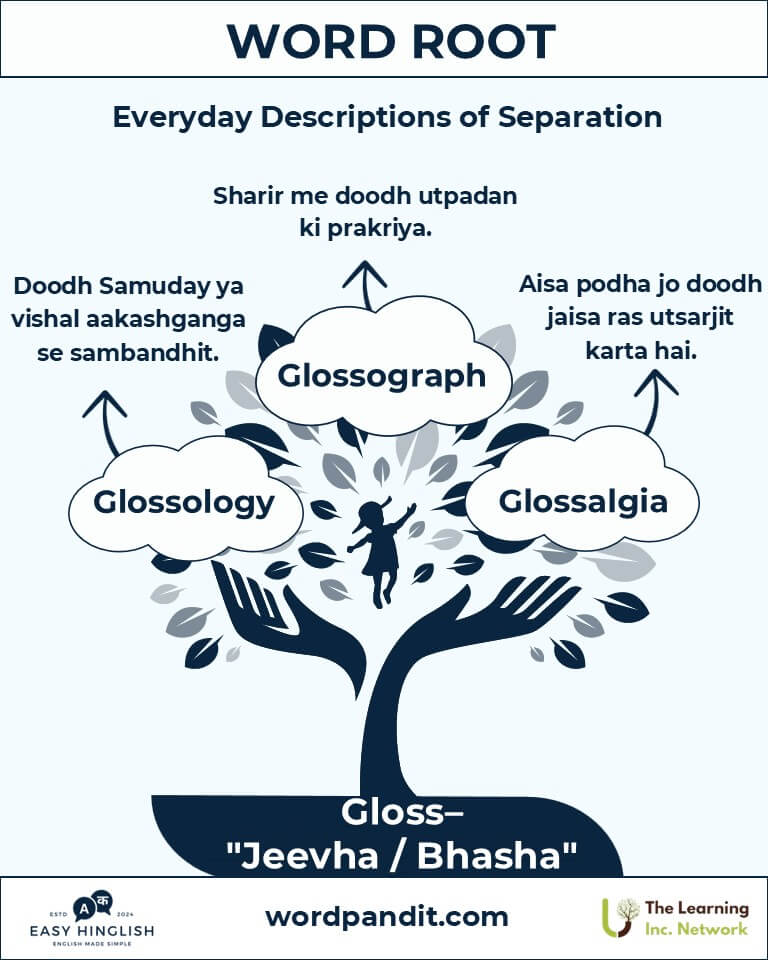Gloss: The Root of Language and Communication
(Bhasha aur Sanchar ka Mool - भाषा और संचार का मूल)

Table of Contents
- Introduction: The Essence of "Gloss"
- Etymology and Historical Journey
- Mnemonic: Unlocking the Power of "Gloss"
- Common Gloss-Related Terms
- Gloss Through Time
- Gloss in Specialized Fields
- Illustrative Story: "Gloss" in Action
- Cultural Significance of "Gloss"
- The "Gloss" Family Tree
- FAQs About the "Gloss" Word Root
- Test Your Knowledge: "Gloss" Mastery Quiz
- Conclusion: The Legacy of "Gloss"
Introduction: The Essence of "Gloss"
(“Gloss” का मूल अर्थ)
The root "Gloss" refers to language, speech, and interpretation. It appears in words related to glossaries, glossing over details, and even in scientific terminology, where explanation and communication are key.

Etymology and Historical Journey
(शब्दों की उत्पत्ति और इतिहास)
The word "Gloss" comes from the Greek word "glossa," meaning "tongue" or "language." Over centuries, it evolved into meanings related to interpretation, translation, and linguistic study.
Mnemonic: Unlocking the Power of "Gloss"
(Mnemonic के ज़रिये “Gloss” को याद रखें)
Imagine a book with highlighted words, each with a small note explaining its meaning—this is the essence of "gloss," helping in understanding language and communication.
Mnemonic Device:
"Gloss helps words shine with meaning and explanation!"
Common Gloss-Related Terms
(Gloss से जुड़े सामान्य शब्द और उनके अर्थ)
- Glossary: A list of words with explanations.
Example: "The book included a glossary to help readers understand difficult terms." - Gloss: Annotations or explanations added to text.
Example: "She wrote a gloss in the margin to clarify the meaning." - Polyglot: A person who speaks multiple languages.
Example: "Being a polyglot, she could converse in five different languages." - Glossolalia: The phenomenon of speaking in tongues.
Example: "Some religious practices involve glossolalia as a form of expression."
Gloss Through Time
(Gloss का समय के साथ सफ़र)
- Ancient Greece: The term "glossa" was used to refer to both the tongue and language itself.
- Medieval Period: Glossaries became essential in texts to explain difficult Latin words.
- Modern Usage: "Gloss" is now widely used in education, linguistics, and even in describing surface shine.
Gloss in Specialized Fields
(विशेष क्षेत्रों में Gloss का महत्व)
- Education: Glossaries are essential in textbooks and academic research.
- Linguistics: The study of glossing helps in understanding translations.
- Religious Studies: Glossolalia refers to the speaking of unknown tongues in religious contexts.
Illustrative Story: "Gloss" in Action
(एक कहानी जो Gloss का महत्व दिखाती है)
In an ancient monastery, a young scholar named Aditi was given the task of copying a manuscript. The text was filled with difficult words and archaic phrases. To help future readers, she began adding glosses in the margins, explaining meanings and interpretations. Centuries later, her work became invaluable in understanding historical texts, proving that "gloss" is more than just words—it is the bridge to knowledge.
Cultural Significance of "Gloss"
(Gloss का सांस्कृतिक महत्व)
From medieval scholars to modern-day language learners, glossing has played a key role in knowledge transmission. Whether in religious scriptures, literature, or multilingual societies, "gloss" ensures that meaning is preserved and accessible.

The "Gloss" Family Tree
(Gloss के परिवार के शब्द)
- Glossa (Greek: "tongue/language")
- Glossary: A list of words with explanations.
- Glossolalia: Speaking in unknown tongues.
- Poly- (Greek: "many")
- Polyglot: A person who speaks multiple languages.
- Lex- (Greek: "word")
- Lexicon: A language dictionary.

The "Gloss" Faqs
Q: What does "Gloss" mean, and where does it come from?
A: "Gloss" means "language," "explanation," or "shine." It comes from the Greek word glossa, meaning "tongue" or "language."
Q: What is the difference between "Glossary" and "Gloss?"
A: A glossary is a list of word meanings, often found at the end of books, while a gloss is a brief explanation or interpretation of a word or text.
Q: What does "Glossophobia" mean?
A: "Glossophobia" refers to the fear of public speaking. It combines "gloss" (language) and "phobia" (fear).
Q: How is "Gloss" used in different fields?
A: "Gloss" is used in:
- Linguistics: Explanation of words or phrases.
- Cosmetics: A shiny finish, like lip gloss.
- Printing: Glossy paper or coated surfaces.
Q: Why is a list of word definitions called a "Glossary"?
A: Since "gloss" means "word explanation," a collection of such definitions naturally became known as a "glossary."
Gloss Mastery Quiz
1. Gloss root का क्या मतलब है?
2. Polyglot किस चीज़ में expert होता है?
3. Glossolalia का क्या मतलब है?
4. Glossary का primary function क्या है?
5. "Gloss" का connection किस field से है जो culture और language को study करता है?
Conclusion: The Legacy of "Gloss"
Glossary ke terms ko clarify karne se lekar polyglots ke cultural bridges tak, "Gloss" human expression ke liye integral hai...








